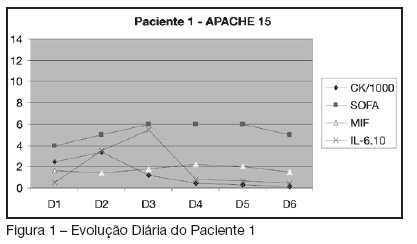
BACKGROUND AND OBJECTIVES: Macrophage migration inhibitory factor (MIF) is a multifunctional cytokine involved in a broad-spectrum pathological events relevant to the immune system. Interleukin-6 (IL-6) is a proinflammatory cytokine that plays an important role in the initial inflammatory response to trauma and the development of early and late multiple organ dysfunction syndrome (MODS). Crush syndrome has been described as the systemic manifestation of muscle cell damage resulting from pressing or crushing. There are few data about MIF and IL-6 in crush syndrome. The aim of this study was to report four cases of crush syndrome, measuring seric levels of MIF and IL-6 and its correlation with severity. CASES REPORTS: Four patients suffering from crush syndrome after an accident with an explosive artifact were enrolled in the study. APACHE II score was checked at admission. It was collected serum sample of these patients during six consecutive days. Serum MIF, IL-6 and creatine kinase (CK) were measured. Sepsis-related organ failure assessment (SOFA) score was evaluated concomitantly. Data were analyzed. CONCLUSIONS: The variations observed in the CK measures were followed by alterations in the cytokines’ level and at the SOFA score, suggesting interdependence between those factors. Other articles have already demonstrated similar results. Although the use of cytokines as biomarkers of severity in trauma is matter of interest, we need large studies with a higher number of patients to validate this observation.
Search
Search in:


Comments